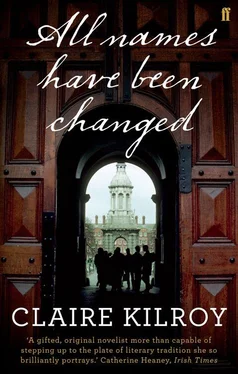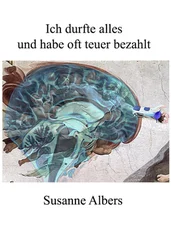Claire Kilroy - All Names Have Been Changed
Здесь есть возможность читать онлайн «Claire Kilroy - All Names Have Been Changed» весь текст электронной книги совершенно бесплатно (целиком полную версию без сокращений). В некоторых случаях можно слушать аудио, скачать через торрент в формате fb2 и присутствует краткое содержание. Год выпуска: 2010, Издательство: Faber & Faber, Жанр: Современная проза, на английском языке. Описание произведения, (предисловие) а так же отзывы посетителей доступны на портале библиотеки ЛибКат.
- Название:All Names Have Been Changed
- Автор:
- Издательство:Faber & Faber
- Жанр:
- Год:2010
- ISBN:нет данных
- Рейтинг книги:5 / 5. Голосов: 1
-
Избранное:Добавить в избранное
- Отзывы:
-
Ваша оценка:
- 100
- 1
- 2
- 3
- 4
- 5
All Names Have Been Changed: краткое содержание, описание и аннотация
Предлагаем к чтению аннотацию, описание, краткое содержание или предисловие (зависит от того, что написал сам автор книги «All Names Have Been Changed»). Если вы не нашли необходимую информацию о книге — напишите в комментариях, мы постараемся отыскать её.
All Names Have Been Changed — читать онлайн бесплатно полную книгу (весь текст) целиком
Ниже представлен текст книги, разбитый по страницам. Система сохранения места последней прочитанной страницы, позволяет с удобством читать онлайн бесплатно книгу «All Names Have Been Changed», без необходимости каждый раз заново искать на чём Вы остановились. Поставьте закладку, и сможете в любой момент перейти на страницу, на которой закончили чтение.
Интервал:
Закладка:
Glynn stood up to absent himself. ‘I’m off to write a novel,’ he announced. ‘Back in a tick.’ He only had the one joke. We watched him lumber towards the men’s toilets, ungainly as a bear.
‘At least he’s writing again,’ Faye offered, forever seeking the silver lining. Was that the night Aisling told me her husband beat her? You know her husband beats her, don’t you? It must have been that night. I can’t tell them apart any more, especially those long diabolical ones.
‘Yeah,’ said Guinevere, ‘you heard what he said about Blake.’
Aisling mumbled something in response. She used to do that a lot — just mumble, forgetting that the outside world was a full remove away and that she was therefore required to project. There were times, I think, when all she could hear were the sloshing sounds inside her own head.
‘Would you care to repeat that?’ Antonia demanded. This was her first line of defence: undermining her opponents using their own words, leaving them wondering what they’d let slip to inadvertently indict themselves. Her ex-husband was a senior counsel.
Aisling repeated herself so clearly and carefully this time that there was no mistaking it. ‘I said, “He didn’t say Blake”.’
Antonia folded her arms. ‘So what did he say?’ Ever the sneering tone which, for all her brains, she never managed to connect to the world’s overwhelmingly negative reaction to her.
Aisling mumbled again, her facial muscles as limp as an arm that had been slept on.
‘Sorry?’
Aisling got to her feet and stood over Antonia. ‘Glynn said “Fake”!’ she yelled. A hush descended on the pub. We were going to get thrown out.
Aisling collapsed back into her seat in a lolling slump, an unattended puppet. Her chin rested on her chest as if her neck were broken, revealing a stripe of light hair along her parting. Underneath the mad make-up, the mourning weeds, the black dye, she could have been a Guinevere.
Glynn returned to the table and set down a clutch of whiskey tumblers on a tray. He doled them out with the matter-of-fact efficiency of an Irish mammy, mindful to demonstrate that favouritism was not in practice and that complaints would not be entertained. You could tell he’d grown up in a large family. ‘There’s no names on them,’ he asserted, his Arklow accent that bit thicker than usual. None of us had eaten, but we didn’t let that stop us.
‘The problem with the contemporary novel,’ he told us as he resumed his seat at the head of the table, having apparently given it some thought at the urinal, ‘is that beginnings are more important than endings. This is because advances are calculated on the basis of the first thirty pages, and readers rarely get beyond the first thirty pages anyway.’ He glared at each of us in turn in case this was an avenue we were contemplating ourselves and seemed disappointed when no one challenged him.
He went on to expound his theory regarding the inverse proportion between literary output and humility. Some writers published more because they had less humility, he argued. Those clowns who were prolific had no shame at all. He cited his main contemporary as proof of this phenomenon — twenty-one novels and counting. Those who barely published at all any more had let their natural God-given modesty get the better of them. Glynn rolled his eyes mournfully at his tumbler at this point. It was an insidious attempt to solicit sympathy from the women, and it worked. ‘But Professor Glynn!’ Faye interjected, as he was hoping she might, ‘Don’t be so humble — your work is wonderful.’
His sleeping-tablet habit was escalating. He was up to three a night by then but was never quite asleep at night, and never quite awake in the morning. This, I got from Aisling, who had sprung back to life and was muttering animatedly into my ear, the magnifying glass around her neck revolving in her hands like a small planet on a wooden axis. ‘Could the sleeping tablets possibly explain his demonic visions?’ she asked me. They were more vivid than ever now. Aisling seemed to think, after ransacking Glynn’s office together, that I would understand what she was talking about. I most certainly did not.
‘He’s seeing demons?’ I repeated incredulously, interrupting her flow.
Aisling looked panicked. ‘Shh, he’ll hear you.’
I glanced at Glynn. He was deep in sparring conversation with Antonia. (‘What bright spark allowed women into Trinity anyway?’ he grunted. ‘Who on earth admitted the Catholics?’ she countered.)
‘Is that what he told you, though? That he’s seeing demons?’
Aisling nodded.
I shrugged and drained my glass. ‘Well, he must have been speaking metaphorically, that’s all I can say.’
‘You were talking about them too. Belsabub and Sattan.’
‘I was talking about medieval English mystery plays.’
‘But you saw the drawings in his red notebook.’
‘They were just doodles.’
‘You don’t understand, Declan,’ Aisling insisted. ‘I recognised them. I recognised the demons in the red notebook. I’ve seen them too, the very same faces. They aren’t doodles: they’re portraits.’
Demons. Even the word. Glynn shouldn’t have burdened Aisling with that guff. Of all of us, she was the one who least needed reminding that a powerful imagination was as much a curse as a gift, that the world could tip into chaos without warning, and that it didn’t get any easier with age. Her world view was fragile, and Glynn abused his position in his endless, ruthless search for an audience, knowing — what with her being the most impressionable — that Aisling would also prove the most receptive. And the least critical. Aisling or Faye. They wouldn’t be up to the like of him.
Faye set down another round of pints. Glynn reached for one without thanking her. ‘Why do you do this to me?’ he entreated Antonia in an uncharacteristically plaintive tone of voice. The pair of them had been huddled over each other the past ten minutes, his arm thrown along the back of the banquette, and she sitting in the crook of it. Antonia threw back her head and laughed, cruelly and with relish, as only she could. Glynn raised the pint to his lips and drank deeply without removing his eyes from her throat. There was something unseemly about the look of gratification on his face. Antonia revelled in the attention.
He started talking in the low rumbling growl again. Antonia had to lean in to hear him. His belly was almost lewd in its tumescence, a great egg cradled on his thighs. How was he getting fatter, when we never saw him eat? You couldn’t help but stare at him, whether you wanted to or not, like a skip full of discarded furniture. Articles you’d no more take into your home yet still you found yourself pausing on the kerb to peer in, urging yourself to move on but unable to.
Glynn was hell bent on finishing whatever it was he had to say to Antonia. Nothing would be permitted to interrupt his soliloquy. That is the problem with first-person narrators, the overbearing, unadulterated self-absorption. No wonder Gladys had dumped him.
‘Stop it, for God’s sake!’ Antonia cried, unable to take any more. Glynn retracted his arm and sat back, a smirk of satisfaction on his face. Oh Christ, I realised, he was fucking her. I can’t say precisely why I felt so sure of it. Nothing that would stand up in court. Aisling dropped her pint on the floor. She simply let go of it, and the glass smashed on the tiles, splashing all over our shoes. Guinevere stooped to pick up the broken pieces.
‘Don’t,’ Aisling warned her.
Glynn glanced at Aisling. The depth of her voice had unnerved him too. Difficult to gauge how far you could push it with her. She was an Emily Dickinson fan. Glynn called for a fresh pint, then they settled again, himself and Antonia, circling each other like caged lions, and us, carrion birds, circling them.
Читать дальшеИнтервал:
Закладка:
Похожие книги на «All Names Have Been Changed»
Представляем Вашему вниманию похожие книги на «All Names Have Been Changed» списком для выбора. Мы отобрали схожую по названию и смыслу литературу в надежде предоставить читателям больше вариантов отыскать новые, интересные, ещё непрочитанные произведения.
Обсуждение, отзывы о книге «All Names Have Been Changed» и просто собственные мнения читателей. Оставьте ваши комментарии, напишите, что Вы думаете о произведении, его смысле или главных героях. Укажите что конкретно понравилось, а что нет, и почему Вы так считаете.












